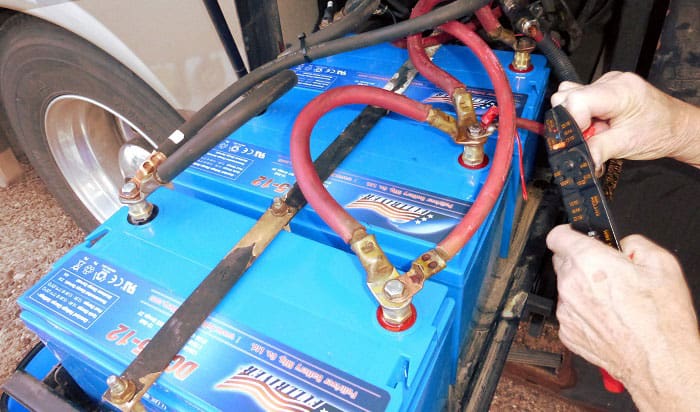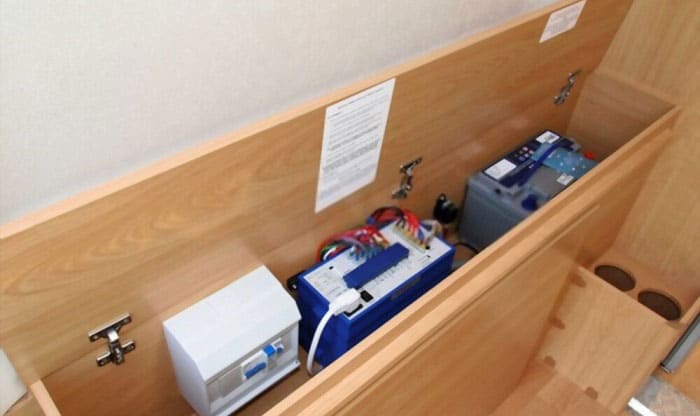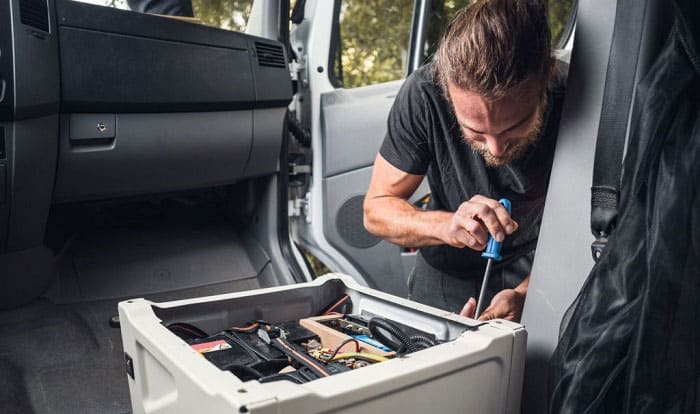Connecting your RV’s electronic devices to the vehicle’s battery can help provide comfortable camping trips. But you might be asking yourself, ‘should I disconnect my RV battery when plugged in?’
To answer the question, ‘should RV battery disconnect on or off,’ you need to understand that you cannot provide sufficient power to appliances and electronics if the battery is disconnected and discharged.
But you can still leave your RV battery plugged into a shore power source while using your vehicle’s devices. That way, you can charge the battery while using your gadgets.
Table of Contents
Should You Disconnect Your RV Battery When Plugged Into Shore Power?
RV shore power is when you connect the vehicle to an electrical grid. Oftentimes, you connect the vehicle’s main power source to a house’s.
Two things happen when you connect your vehicle to a shore power source: (1) the connection powers electronics using AC power, and (2) the RV’s batteries will charge. Therefore, you might not want the travel trailer battery disconnect when plugged in.
But you still have the option to disconnect RV battery when in storage. For instance, if you use an inverter with your RV’s battery, you can leave the power cell disconnected for extended periods.
Keep in mind that if you detach the battery from the vehicle during a power outage, the RV will not automatically switch to its backup power system.
What Is the Purpose Of the Battery Disconnect on an RV?
Many RVs have battery disconnect switches to cut off the power immediately. It is a safety precaution to prevent potential electric shocks and power surges during vehicle maintenance tasks.
Additionally, activating the RV battery disconnect switch can reduce battery overcharging. Failure to remove the power pack from its charging source for extended periods may increase the discharge rate.
In turn, habitually leaving the RV battery charging for long periods may reduce its service life. Cutting the power to the battery through the disconnect switch can ultimately help minimize possible issues during outdoor camping trips.
Should I Leave the RV Inverter on When Plugged in?
An RV inverter helps convert the DC power from the RV battery to usable AC energy for your appliances and electronics. In other words, you cannot use your devices if you connect them directly to the battery.
But you do not need to use the RV inverter or leave it plugged in every time. It is because this device can still drain power from the battery when it is not in use.
However, some models have a power saver mode to reduce energy consumption while staying connected to the battery. If you are unsure if your RV inverter has this feature, check the owner’s manual or contact the manufacturer.
Should We Switch Off Inverter During Lightning?
You may want to switch off the inverter during lightning or thunderstorms. However, leaving it turned on during bad weather may not pose significant damage to the inverter, the vehicle, and the people inside the RV.
Vehicles, particularly those properly grounded, often do a reasonably good job in dissipating high voltage electricity. The RV’s bodyshell will capture most of the electrical surge and direct it to the ground.
But you should still take note of some exceptions. For example, if you leave the RV connected to a shore power source during a lightning storm, the power surge can travel from the mains to your vehicle.
Therefore, consider disconnecting your RV’s battery from shore power during bad weather. But you can still leave the inverter operational for you and your fellow campers to enjoy your devices while keeping safe inside the vehicle.
Also, consider the following tips to avoid hazards during a lightning storm while RV camping:
- Move away from tall structures like trees
- Turn off outside generators
- Stay inside the vehicle all the time while the storm is still active
- Stay away from doors and windows
Conclusion
Now that you are at the end of this post, you should know the answer to the question, ‘should I disconnect my RV battery when plugged in?’ In summary, you can leave your battery plugged into a shore power source to charge it and use your connected devices.
However, you may want to disconnect your RV’s battery and inverter from shore power during a thunderstorm. But you can still use those devices while lightning is present nearby as the vehicle should help shield them from significant damage.

Hi, I am Joseph. Carpe diem! Seize the day! That’s always been my life motto. If you haven’t seen some of the most beautiful places in the country, you are missing out on incredible adventures.




